Scrambling to fill out a March Madness bracket? Betting lunch money that you can pinpoint the Final Four better than co-workers or family?
Good luck! You're among about one-third of Americans who at least occasionally bet on sports among friends or through an office pool, according to a poll released Wednesday by The Associated Press-NORC Center for Public Affairs Research.
Still, with all the action on the NCAA men's basketball tournament, the survey finds less support for legal betting on college sports than on the pros. Six in 10 in the survey want betting on professional sports to be legal in their state, far more than the 42 percent who feel that way about college athletics.
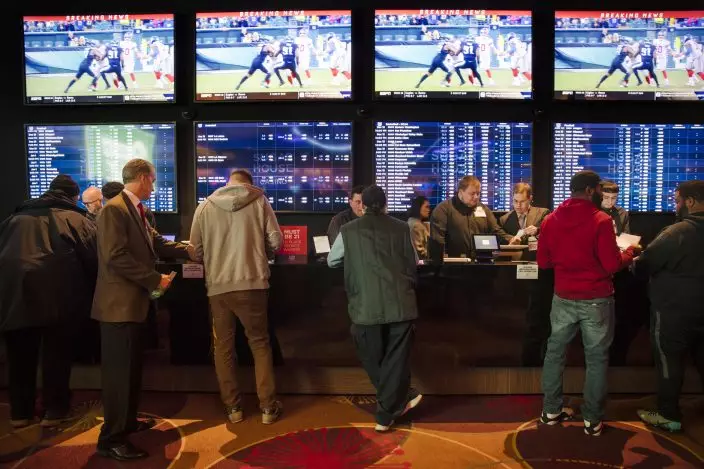
FILE - In this Thursday, Dec. 13, 2018, file photo, gamblers place bets in the temporary sports betting area at the SugarHouse Casino in Philadelphia. About six in 10 Americans want betting on professional sports events to be legal in their state, but fewer feel that way about college athletics, according to a new poll conducted by The Associated Press-NORC Center for Public Affairs Research released Wednesday, March 20, 2019. The poll finds 42 percent favor legal betting on college sports. (AP PhotoMatt Rourke, File)
This is the first college basketball championship since the Supreme Court cleared the way last year for states to offer legal sports betting if they choose. Eight states currently allow the wagers: Delaware, Mississippi, Nevada, New Jersey, Pennsylvania, Rhode Island, West Virginia and New Mexico, where sports bets are done through a tribal compact.
Many more states are considering sports betting.
Eilers & Krejcik Gaming, which tracks sports gambling legislation, estimates that sports betting will be legal in 39 states by the end of 2023. The company estimates $15.2 billion in sports bets would be made on the NCAA tournament alone if sports betting was legalized across the country.
Among those who say they're very interested in sports, 69 percent think betting on professional sports should be legal and 52 percent say the same about college sports. Among those who are not very interested in sports, 50 percent favor betting on pro sports and 38 percent support wagers on college sports.
Men are somewhat more likely than women to support gambling on professional sports, 65 percent to 56 percent. Forty-five percent of men and 40 percent of women think betting on college sports should be legal.
Support for legal sports betting appears to cross political party lines: 65 percent of Democrats and 59 percent of Republicans want legal betting on professional sports, while only 47 percent of Democrats and 41 percent of Republicans think it should be legal to bet on college sports.
"People should be able to do what they want with their money," said Karen Warnshuis of Clovis, California, where sports betting is not legal. "If they want to bet on sports, then they should be able to."
The 57-year-old co-owner of a construction business also favors allowing legal wagers on collegiate athletics, although she worries about possible cheating.
"The one thing I don't like about sports betting is it becomes questionable whether teams or individual players might do something bad," she said. "But then, that could have been happening before legal sports betting, too."
Shelley Matthews, a 70-year-old from Dallas, Texas, is against betting on any level of sports.
"Gambling is not a good idea," he said. "I don't gamble, and I don't know anybody who does."
He, too, worried about the possibility of games being fixed if large amounts of money were riding on them, and said many people gamble more than they can afford, harming their families and communities.
Arturo Isla, a 69-year-old banker from Jacksonville, Florida, opposes wagering on any level of sports, due in large part to the experience of a family friend whose marriage broke up. He said the friend's husband was a heavy gambler.
Isla said he understands the rationale of legalizing, taxing and regulating sports betting to help reduce control of the activity by organized crime and offshore internet sites.
"That's valid, but just because something is legal doesn't mean there aren't negative aspects to it," he said. "People can get addicted, and it can affect their personal lives and their families."
Betting among friends or through office pools is currently the most popular form of sports betting, according to the survey. Thirty-six percent of Americans say they do that at least occasionally, while 20 percent say they've at least occasionally placed bets at casinos and 10 percent through betting or fantasy sports websites or apps.
But the poll also found most people say they currently never gamble on sports, including online (89 percent), at casinos (79 percent) or among friends (63 percent). No more than 5 percent of Americans say they frequently take part in any of those forms of sports betting.
In general, the poll found, most Americans consider gambling to be a problem, but not a major one. About 2 in 10 think gambling is a major problem in the U.S. now, 6 in 10 think it's a minor problem, and about 2 in 10 think it's not a problem.
The AP-NORC poll of 1,063 adults was conducted March 14 to 18 using a sample drawn from NORC's probability-based AmeriSpeak Panel, which is designed to be representative of the U.S. population. The margin of sampling error for all respondents is plus or minus 4.1 percentage points.
Respondents were first selected randomly using address-based sampling methods and later were interviewed online or by phone.
For more polling information, AP-NORC Center at http://www.apnorc.org and for more AP sports, https://apnews.com/apf-sports and https://twitter.com/AP_Sports
Follow Wayne Parry at http://twitter.com/WayneParryAC
UNITED NATIONS (AP) — The United States vetoed a widely backed U.N. resolution Thursday that would have paved the way for full United Nations membership for Palestine, a goal the Palestinians have long sought and Israel has worked to prevent.
The vote in the 15-member Security Council was 12 in favor, the United States opposed and two abstentions, from the United Kingdom and Switzerland. U.S. allies France, Japan and South Korea supported the resolution.
The strong support the Palestinians received reflects not only the growing number of countries recognizing their statehood but almost certainly the global support for Palestinians facing a humanitarian crisis caused by the war in Gaza, now in its seventh month.
The resolution would have recommended that the 193-member U.N. General Assembly, where there are no vetoes, approve Palestine becoming the 194th member of the United Nations. Some 140 countries have already recognized Palestine, so its admission would have been approved, likely by a much higher number of countries.
U.S. deputy ambassador Robert Wood told the Security Council that the veto “does not reflect opposition to Palestinian statehood but instead is an acknowledgment that it will only come from direct negotiations between the parties."
The United States has “been very clear consistently that premature actions in New York — even with the best intentions — will not achieve statehood for the Palestinian people,” deputy State Department spokesman Vedant Patel said.
His voice breaking at times, Palestinian U.N. Ambassador Riyad Mansour told the council after the vote: “The fact that this resolution did not pass will not break our will and it will not defeat our determination.”
“We will not stop in our effort,” he said. “The state of Palestine is inevitable. It is real. Perhaps they see it as far away, but we see it as near.”
This is the second Palestinian attempt for full membership and comes as the war in Gaza has put the more than 75-year-old Israeli-Palestinian conflict at center stage.
Palestinian President Mahmoud Abbas first delivered the Palestinian Authority’s application for U.N. membership in 2011. It failed because the Palestinians didn’t get the required minimum support of nine of the Security Council’s 15 members.
They went to the General Assembly and succeeded by more than a two-thirds majority in having their status raised from a U.N. observer to a non-member observer state in 2012. That opened the door for the Palestinian territories to join U.N. and other international organizations, including the International Criminal Court.
Algerian U.N. Ambassador Amar Bendjama, the Arab representative on the council who introduced the resolution, called Palestine’s admission “a critical step toward rectifying a longstanding injustice" and said that “peace will come from Palestine’s inclusion, not from its exclusion.”
In explaining the U.S. veto, Wood said there are “unresolved questions” on whether Palestine meets the criteria to be considered a state. He pointed to Hamas still exerting power and influence in the Gaza Strip, which is a key part of the state envisioned by the Palestinians.
Wood stressed that the U.S. commitment to a two-state solution, where Israel and Palestine live side-by-side in peace, is the only path for security for both sides and for Israel to establish relations with all its Arab neighbors, including Saudi Arabia.
“The United States is committed to intensifying its engagement with the Palestinians and the rest of the region, not only to address the current crisis in Gaza, but to advance a political settlement that will create a path to Palestinian statehood and membership in the United Nations,” he said.
Mansour, the Palestinian U.N. ambassador, reiterated the commitment to a two-state solution but asserted that Israel believes Palestine "is a permanent strategic threat."
"Israel will do its best to block the sovereignty of a Palestinian state and to make sure that the Palestinian people are exiled away from their homeland or remain under its occupation forever,” he said.
He demanded of the council and diplomats crowded in the chamber: “What will the international community do? What will you do?”
Israeli-Palestinian negotiations have been stalled for years, and Israel’s right-wing government is dominated by hard-liners who oppose Palestinian statehood.
Israeli U.N. Ambassador Gilad Erdan called the resolution “disconnected to the reality on the ground” and warned that it “will cause only destruction for years to come and harm any chance for future dialogue.”
Six months after the Oct. 7 attack by the Hamas militant group, which controlled Gaza, and the killing of 1,200 people in “the most brutal massacre of Jews since the Holocaust,” he accused the Security Council of seeking “to reward the perpetrators of these atrocities with statehood.”
Israel’s military offensive in response has killed over 32,000 Palestinians, according to Gaza’s health ministry, and destroyed much of the territory, which speaker after speaker denounced Thursday.
After the vote, Erdan thanked the United States and particularly President Joe Biden “for standing up for truth and morality in the face of hypocrisy and politics.”
He called the Palestinian Authority — which controls the West Bank and the U.S. wants to see take over Gaza where Hamas still has sway — “a terror supporting entity.”
The Israeli U.N. ambassador referred to the requirements for U.N. membership – accepting the obligations in the U.N. Charter and being a “peace-loving” state.
“How can you say seriously that the Palestinians are peace loving? How?” Erdan asked. “The Palestinians are paying terrorists, paying them to slaughter us. None of their leaders condemns terrorism, nor the Oct. 7 massacre. They call Hamas their brothers.”
Despite the Palestinian failure to meet the criteria for U.N. membership, Erdan said most council members supported it.
“It’s very sad because your vote will only embolden Palestinian rejectionism every more and make peace almost impossible,” he said.

Algeria's Permanent Ambassador to the United Nations Amar Bendjama speaks during a Security Council meeting at United Nations headquarters, Thursday, April 18, 2024. (AP Photo/Yuki Iwamura)

Israeli Ambassador to the United Nations Gilad Erdan speaks during a Security Council meeting at United Nations headquarters, Thursday, April 18, 2024. (AP Photo/Yuki Iwamura)
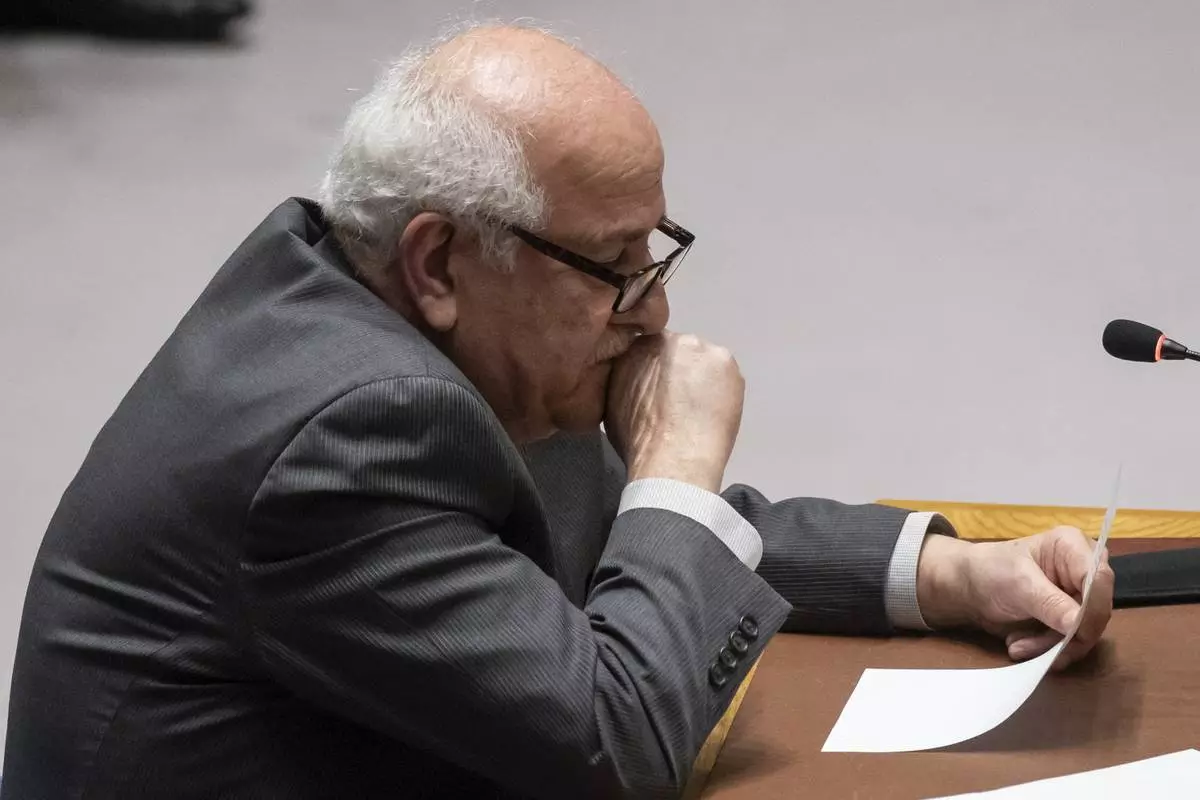
Palestinian Ambassador to the United Nations Riyad Mansour holds tears while speaking during a Security Council meeting at United Nations headquarters, Thursday, April 18, 2024. (AP Photo/Yuki Iwamura)
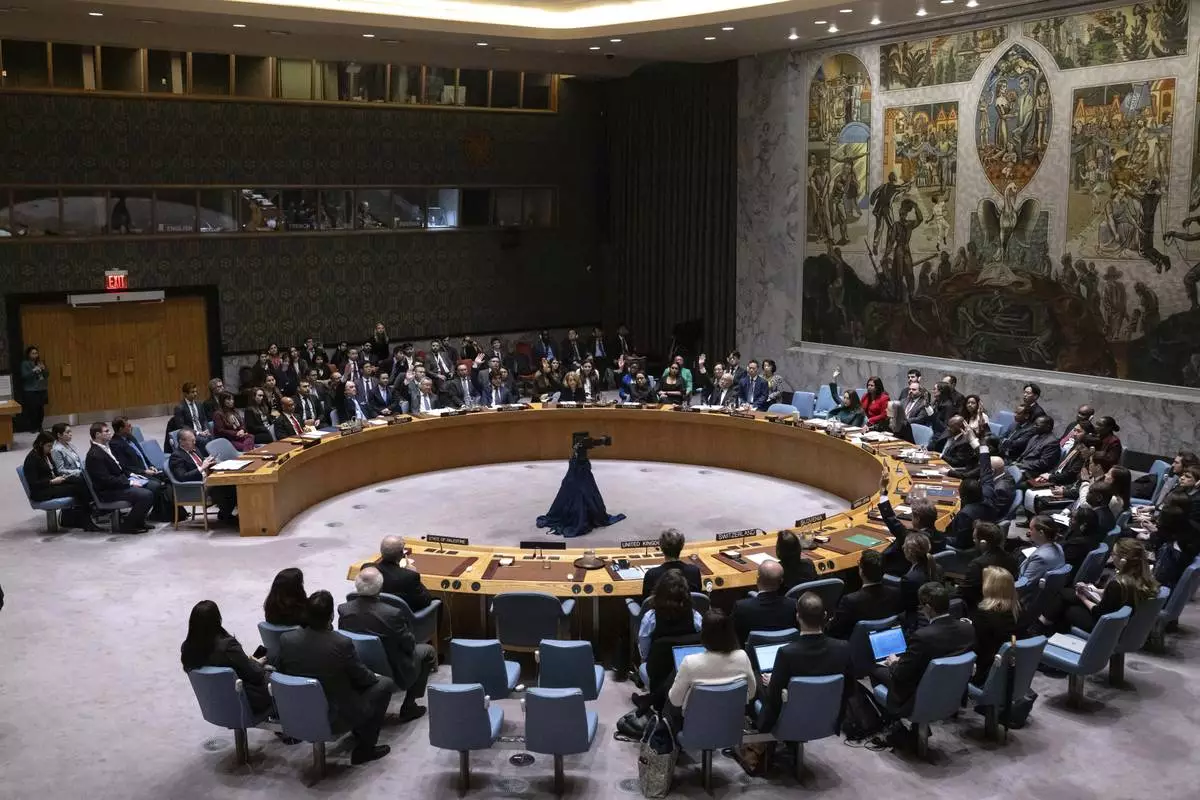
Representatives of member countries take votes during a Security Council meeting at United Nations headquarters, Thursday, April 18, 2024. (AP Photo/Yuki Iwamura)

Palestinian Ambassador to the United Nations Riyad Mansour, left, and United Nations Secretary-General Antonio Guterres speak before a Security Council meeting at the United Nations headquarters, Thursday, April 18, 2024. (AP Photo/Yuki Iwamura)
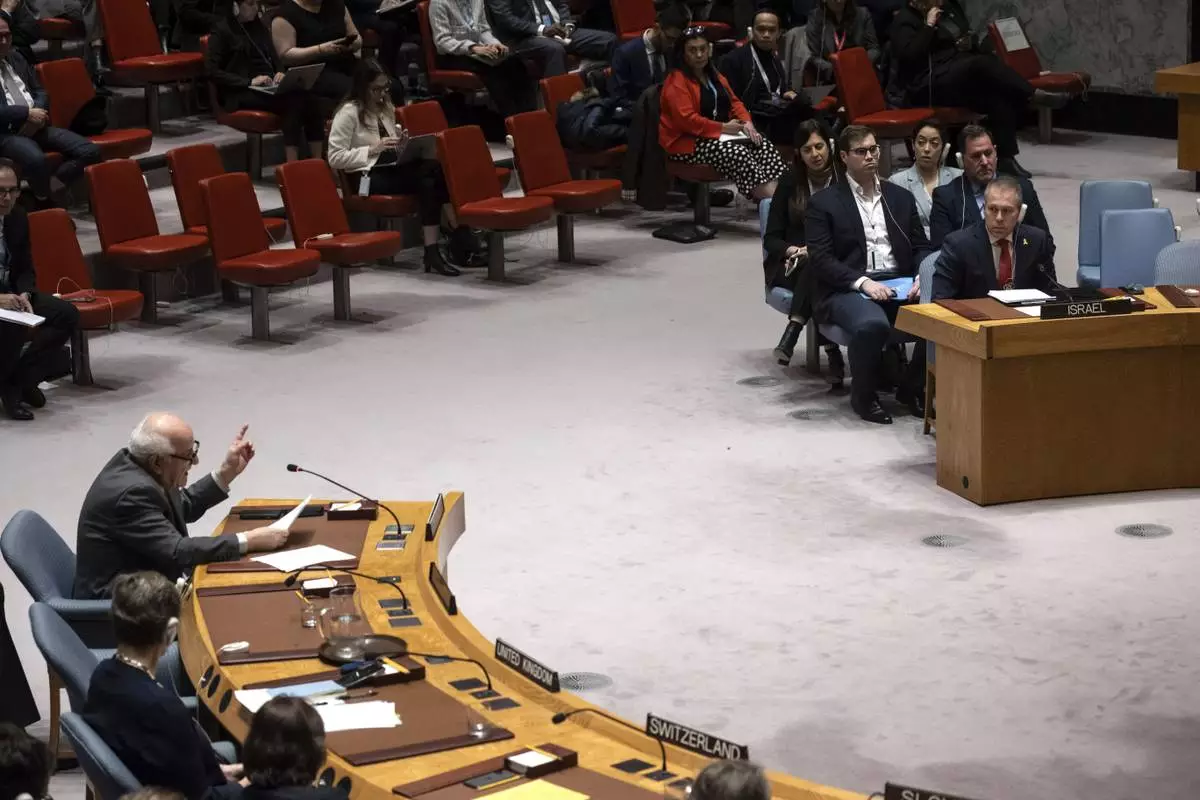
Palestinian Ambassador to the United Nations Riyad Mansour speaks during a Security Council meeting at United Nations headquarters, Thursday, April 18, 2024. (AP Photo/Yuki Iwamura)
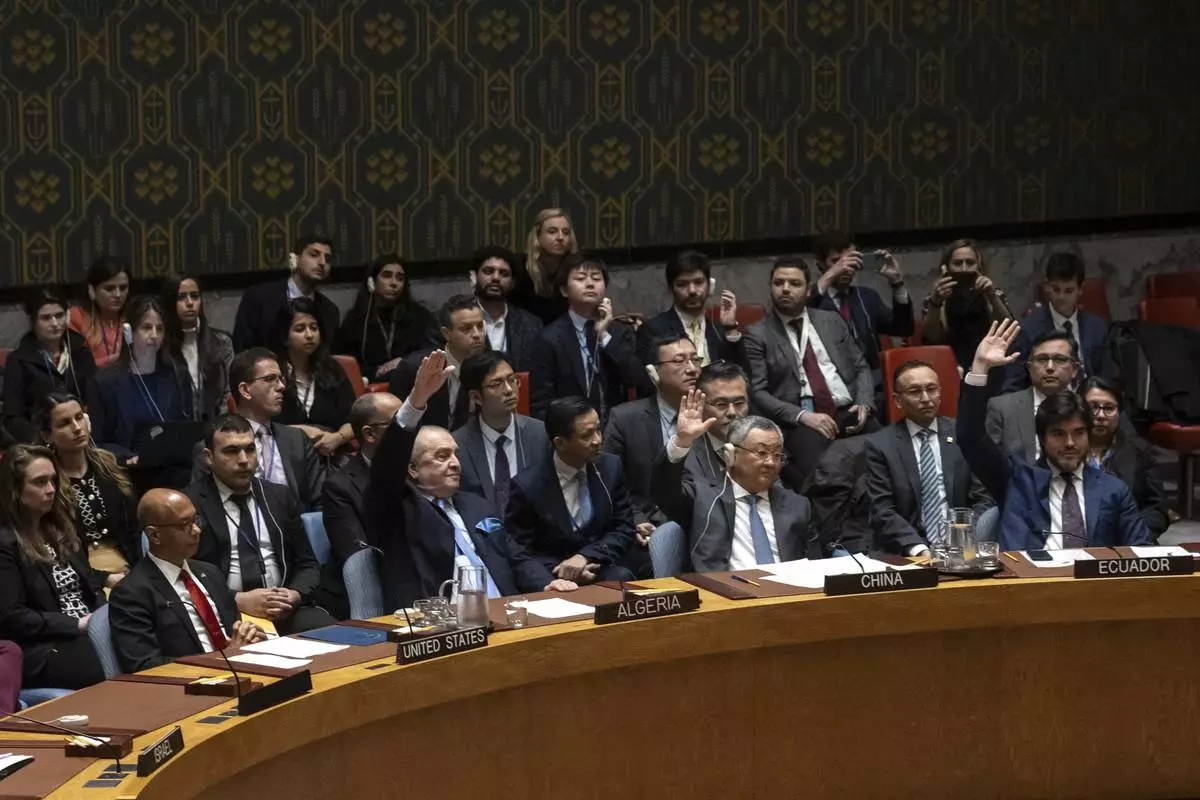
Representatives of member countries take votes during a Security Council meeting at United Nations headquarters, Thursday, April 18, 2024. (AP Photo/Yuki Iwamura)
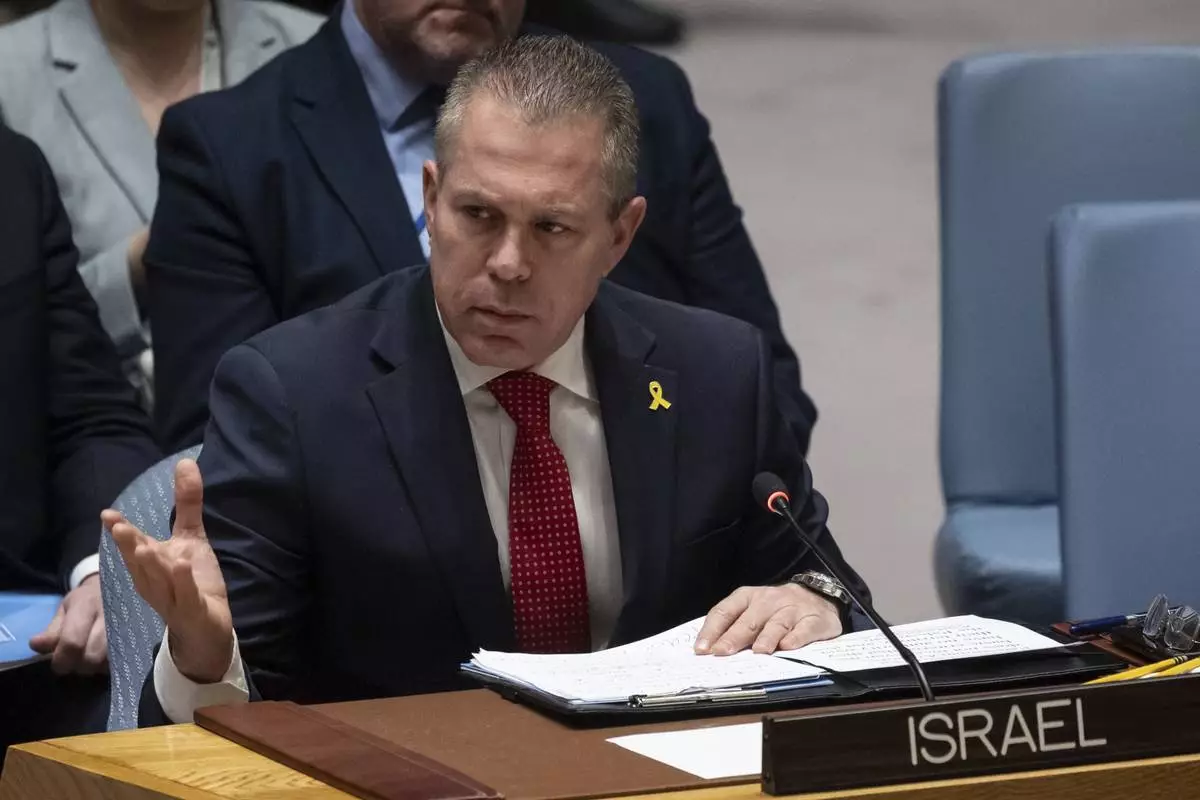
Israeli Ambassador to the United Nations Gilad Erdan speaks during a Security Council meeting at United Nations headquarters, Thursday, April 18, 2024. (AP Photo/Yuki Iwamura)
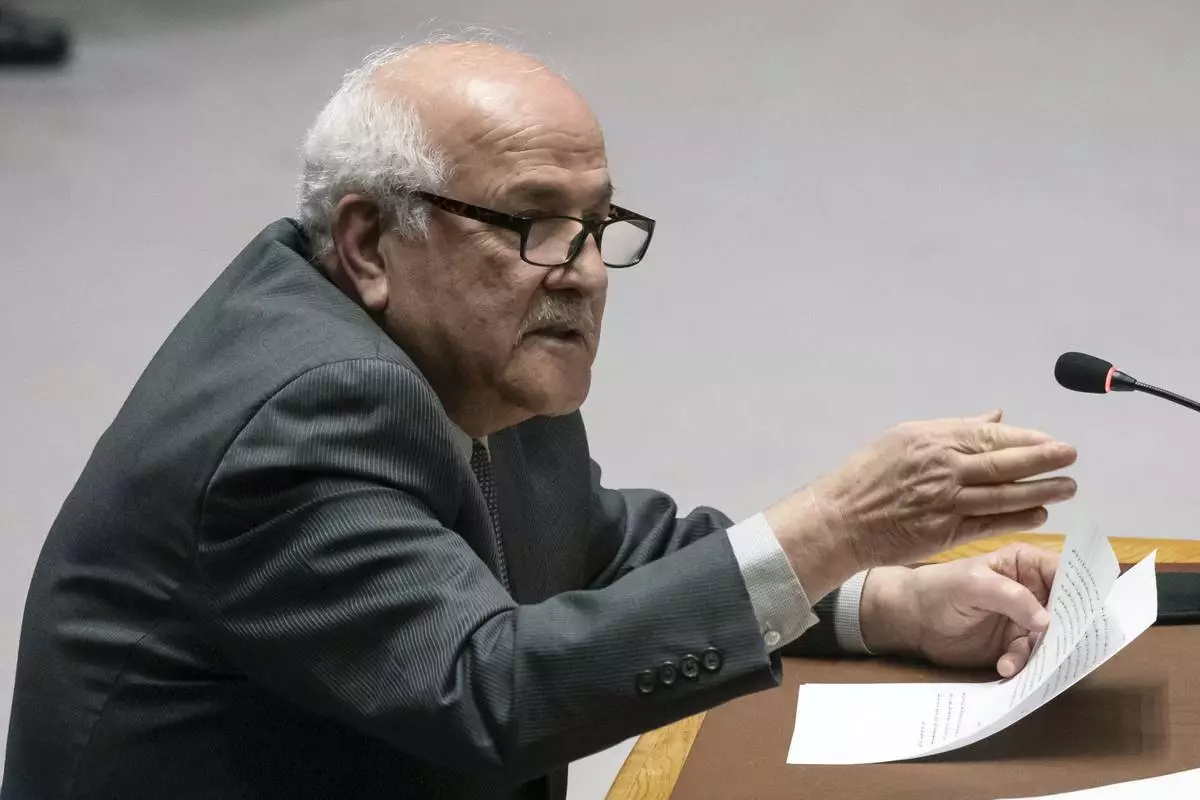
Palestinian Ambassador to the United Nations Riyad Mansour speaks during a Security Council meeting at United Nations headquarters, Thursday, April 18, 2024. (AP Photo/Yuki Iwamura)
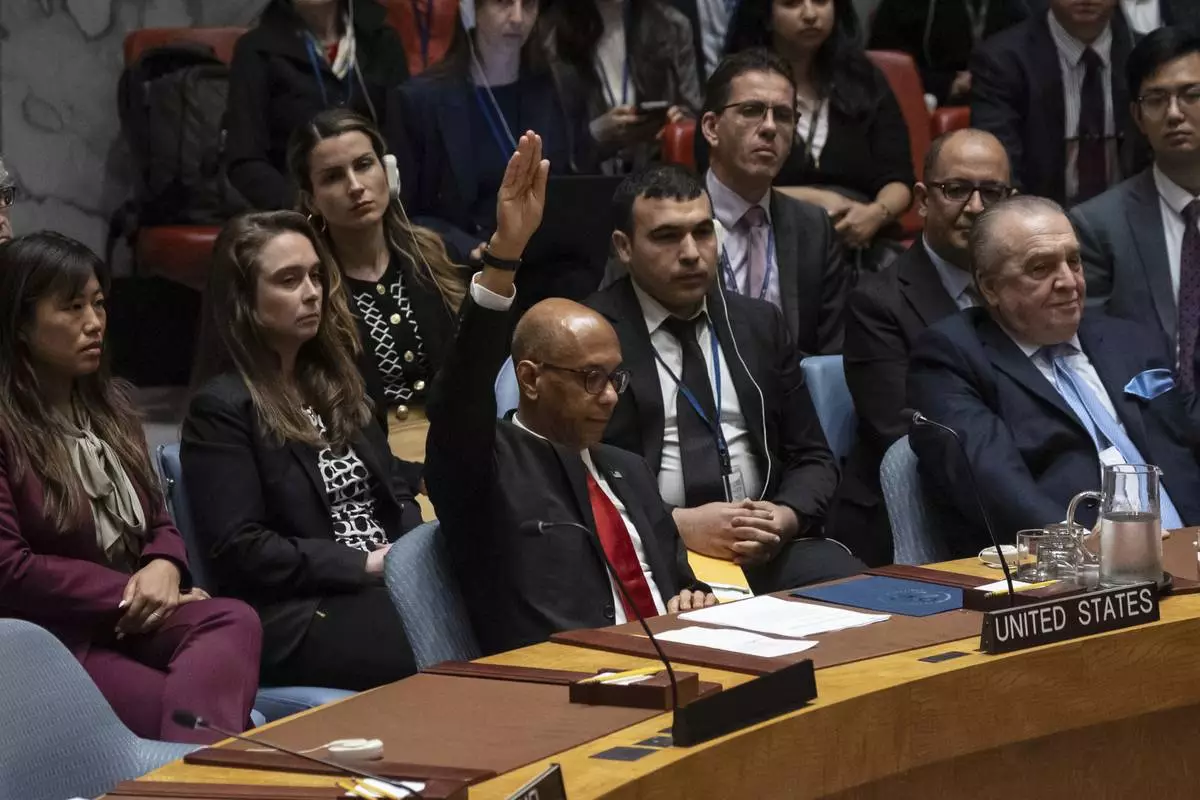
U.S. Deputy Ambassador Robert Wood votes against resolution during a Security Council meeting at United Nations headquarters, Thursday, April 18, 2024. (AP Photo/Yuki Iwamura)




















